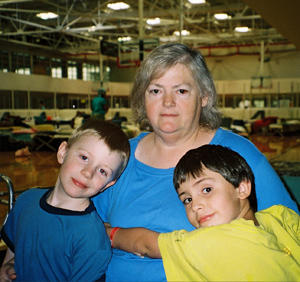Moving On or Settling In

Thursday, September 08, 2005 — Tuscaloosa, Ala. – Hazel Rodgers sits on the cot with her three-year-old granddaughter asleep on her lap while her six-year-old twin grandsons play hide and seek nearby. Her husband lies on the cot beside her, relieving his labored breathing by using his oxygen mask.
Hazel Rodgers hugs her six-year-old twin grandsons at the shelter in Tuscaloosa, Ala., where she came before Hurricane Katrina hit, fleeing the shoreline of Gulfport, Miss., where she lives in a trailer on a bayou. (Photo Source: American Red Cross)
For 10 days Rodgers and her family have found shelter, food and medical assistance in the shelter operated by the American Red Cross in a state-of-the-art recreation centre at the University of Alabama. They are among 159,000 hurricane survivors that have taken refuge in the nearly 650 Red Cross shelters being operated in 17 states.
This prosperous industrial city in Alabama is the first city north of the hurricane-ravaged area that you reach when driving north up the state highway. It opened its doors to help evacuees and is now working to assist those eager to move into apartments and seek jobs in their city.
But not everyone is able to strike out on their own yet. Rodgers is a diabetic who has limited mobility and uses a wheelchair. Her husband is an epileptic and suffers from emphysema. She came to the shelter in advance of Hurricane Katrina with seven family members.
After the storm, Rodgers’ daughter and son-in-law returned to her trailer on a bayou near Gulfport, Miss., to find it intact but rain-soaked and smelling of mold. They also learned that the son-in-law’s father, who stayed behind, had survived being swept into a tree by the storm surge.
Her daughter and family are like most of the thousands of people who have stayed in the shelter – they are eager to move on and are trying to decide where to go. Rodgers appreciates all that has been done for her but is eager to leave the busy shelter, where as many as 500 people sleep each night.
“We are trying to make life more normal for ourselves and the kids,” she said. “One of my grandsons lost a tooth and he was very worried that the tooth fairy would not find him. A lady next to us gave me some change. He was checking his pillow every five minutes to make sure it was there. When he found the money next morning, he was very happy and so was everyone else.”
This state-of-the-art recreation center at the University of Alabama in Birmingham has been turned into an American Red Cross shelter that sleeps up to 500 people a night. (Photo Source: American Red Cross)
The numbers in the University shelter are declining as people move into housing made available to them in Tuscaloosa. Many families are taking offers of assistance from community and church groups to move into empty apartments or are being billeted.
Other families said that they are reluctant to leave the shelter until they find a job.
Outside of Tuscaloosa, there is a second shelter operated in the training centre of the Mercedes-Benz plant. A Baptist pastor from New Orleans is trying to figure out where to go next.
“The church will rebuild and restart with the people who decide to stay,” he said. “The young kids in the congregation want to go to new cities and move on. The older people want to return home.”
He is worried that his kids should not go back to their home in eastern New Orleans because of the effect the contaminated water will have on their home.
“I know there is chemical waste in the area, and I am concerned about the effect it will have on the building and anyone who lives in it in the future,” the Pastor said. “I have life and I have health, so I don’t need to worry about wealth – the good Lord will provide.”
The Pastor also indicated that the people at the shelter had been great.
“We have been so well cared for by Red Cross and all the volunteers. This shelter is a Mercedes in more than one way” he said. “It’s a great place for us to collect our thoughts before we make a move to the next stage.”

0 Comments:
Post a Comment
<< Home